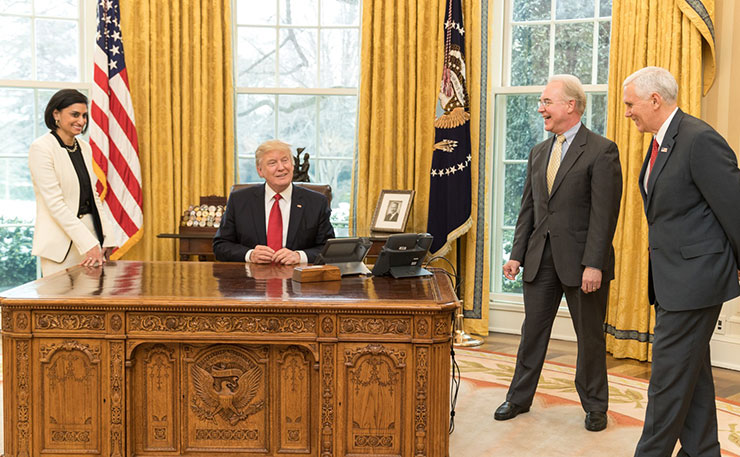When Australia struck a deal to transfer refugees to the US it gave Donald Trump leverage. With the new President happy to continue wars abroad, that’s looking like an increasingly dangerous compromise, writes Max Chalmers.
When Americans elected Donald Trump as their President in late 2016, the working assumption was that working assumptions were now bunk. Political norms regarding the ideological battle lines a leader from one of the two major parties would draw, as well as the way they would comport themselves, were tossed. Open white nationalism and presidential tweet-storms were in; foreign interventions, cordial media relations, and Republican freemarket orthodoxy were out.
And yet racing towards the 100-day mark of Trump’s presidency, it seems one of the most universal and toxic norms of politics has not been overturned. At least in the short-term, militarism abroad still pays.
In recent weeks, two particular strikes drew massive attention in the US and around the world. The first was a cruise missile attack on a Syrian government airbase. The second, the dropping of a GBU-43/B Massive Ordinance Air Blast Bomb, the largest non-nuclear weapon in America’s arsenal, in Afghanistan, purportedly to destroy a series of tunnels and caves used by ISIS. Elsewhere, Trump has sent an aircraft carrier to North Korea.
The response to these moves has been relatively positive on the US domestic front, especially among the media establishment. Fareed Zakaria, a Washington Post columnist who before the election referred to Trump as “a cancer on American democracy”, described the anti-Assad strike as the moment Trump became President. (In response, Intercept journalist Jeremy Scahill remarked in a live interview: “You know, Fareed Zakaria – if that guy could have sex with this cruise missile attack, I think he would do it.”)
That was nothing compared to Brian Williams, an anchor with left-leaning MSNBC. Williams described the weapons fired at Syria as “beautiful” and quoted Lennon Cohen.
MSNBC’s Brian Williams is in awe of the “beauty” of Tomahawk missiles, CNN’s James “Spider” Marks compares operation to NCAA basketball pic.twitter.com/yxjW0tG7Dg
— Lee Fang (@lhfang) April 7, 2017
Over at Fox News the reaction was more or less as you might have expected.
The fawning coverage military violence often inspires is dangerous at the best of times, but even more so given Trump’s bizarre cable-news feedback loop. As has been well documented now, Trump follows the news with unusual obsession: he struggles to resist the allure of a television screen even when he’s mid-interview. There has been a string of instances where the President seemed to be taking his own talking points from cable news, tweeting shortly after a story in rage or agreement. His presidency is made for broadcast, and he’s watching every second that he can.
Add to this the fact Trump’s Syria strike revealed his base can get on board with such attacks and there’s every reason to think Trump will maintain or ramp-up US attacks abroad.
This is not good news for Australia.
Back in February, a report in The Australian alleged that US officials were expecting favours in return for accepting around half of the refugees Australia has marooned on Manus and Nauru.
“Although the Prime Minister’s office refused to comment further on the deal, US officials privately have made no secret that Australia would ultimately be expected to reciprocate, most likely on issues of force commitment to Iraq and Syria in the fight against Islamic State or freedom-of-navigation exercises in the South China Sea.”
It’s hard to know how seriously to trust such anonymously sourced backgrounding. Yet it certainly fits with the howls that emanated from Trump’s team in regards to the maybe-on, maybe-off deal. Trump is not a charitable man, and he has made it clear he will not lead a charitable administration. If the deal goes ahead he will expect something in return.
One month after the Turnbull-Trump blow-up, Immigration Minister Peter Dutton effectively admitted that the refugee swap was part of a deal, and hinted that Australia’s leverage was the refugees it had accepted to take from Costa Rica. Don’t take our unwanted and we won’t take yours, seemed to be Dutton’s message.
The problem is, what was leverage over the Obama administration is not leverage over Trump. The previous US government had worked to ease pressure on the southern border in part by helping refugees fleeing violence in South America find resettlement after arriving in Costa Rica. Needless to say, the US’s approach to that border is in the process of a massive shake up. Perhaps Trump’s administration will still want to help resettle refugees from Costa Rica abroad – but will it be prepared to take a cohort made up largely of refugees from Muslim countries in return? It strikes as very unlikely.
Thus Dutton and Malcolm Turnbull will find themselves under greater pressure to help Trump in other ways. Don’t be too surprised if their acquiescence to US foreign policy outdoes that of previous Australian leaders.
Once again, Australia’s refusal to resettle the people on Manus and Nauru comes back to bite. What would we really prefer? A few thousand new Australians, or a debt to Donald Trump.
Donate To New Matilda
New Matilda is a small, independent media outlet. We survive through reader contributions, and never losing a lawsuit. If you got something from this article, giving something back helps us to continue speaking truth to power. Every little bit counts.






